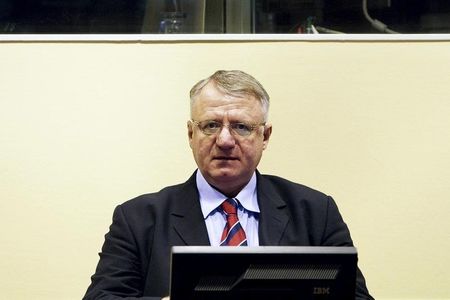By Thomas Escritt
AMSTERDAM (Reuters) - The United Nations court trying crimes from the bloody break-up of former Yugoslavia is considering provisional release for an ailing Serbian former politician in detention awaiting a verdict for over a decade.
In a filing published on Wednesday, judges at the Yugoslavia tribunal said they had information suggesting Vojislav Seselj's health had declined and were considering granting provisional release to let him be treated elsewhere.
Seselj's allies have said the radical Serbian nationalist, now 60, is seriously ill with cancer.
Prosecutors allege that Seselj incited his followers to murder, ethnic cleansing and other war crimes in multi-ethnic Bosnia and in Croatia during the wars.
Judges received from Serbia's government guarantees that it could ensure Seselj would have no contact with any of his victims or any of the witnesses against him.
In his heyday, he was known as a firebrand who gave hate-filled speeches to parliament.
Lawyers and scholars have criticised the tribunal for allowing Seselj to remain in detention so long. He gave himself up to the court in 2003 and his trial began three years later.
The verdict, due last year, was delayed when one of the judges, Frederik Harhoff from Denmark, was taken off the case after making his views on this and other cases known in an e-mail leaked to a Danish newspaper.
Through the Yugoslav wars of the 1990s, Seselj was political mentor to Serbia's current prime minister and president, Aleksandar Vucic and Tomislav Nikolic, until the pair broke away from Seselj's ultranationalist Serbian Radical Party in 2008 and shifted to pro-European policies.

He is still revered by hardline nationalists in Serbia, but his Radical Party has been forced to the fringes of the Serbian political scene and is no longer represented in parliament.
(Reporting By Thomas Escritt in Amsterdam and Matt Robinson in Belgrade; Editing by Tom Heneghan)
